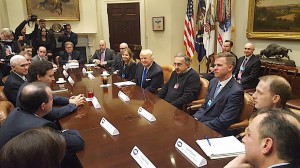
The Big Three automakers would like NAFTA to remain status quo; however, the Trump Administration is renegotiating the deal this summer.
Trump Administration officials recently began the official process to open talks about renegotiating the North American Free Trade Agreement and they’re going to find the auto industries officially agree on at least one point.
The auto industries in the U.S., Mexico and Canada all believe there shouldn’t be any changes to the rules of origin, Eduardo Solis, president of the Mexican automakers industry group AMIA, told Reuters.
“Our position is that the trade agreement has been a success, and we shouldn’t be touching something as important as the rules of origin,” Solis told Reuters.
Under the trade deal between the United States, Mexico and Canada, rules of origin stipulate that products must meet minimum regional, or NAFTA-wide, content requirements to be tariff-free. The rules of origin have been critical to the creation of value and industry integration, said Solis.
“In terms of access to markets and rules of origin, what we have is a shared position,” he said.
(Mexico trade chief says NAFTA redo must benefit everyone. Click Here for the story.)
This position will only serve to put pressure on the Trump Administration as it seeks to get what it perceives to be a better deal. Providing some motivation to the Trump team are the recent auto industry numbers from Mexico.
Overall, Mexican automotive exports rose 16.1% in April, compared to year-earlier numbers, while production jumped a more modest 3.2%, according to the Mexican Auto Industry Association. For the first four months of the year, meanwhile, total exports jumped 15 percent.
Exports directly targeting the United States, meanwhile, surged by nearly 20% year-over-year, to 179,958 vehicles.
Another area of agreement is dealing with currency manipulation. The auto industries in each country are significantly impacted by currency fluctuations – intentional or due to market forces.
Trump has accused both Japan and China of manipulating their currency, although he backed off that in regard to China in recent weeks as the country has been trying to help with North Korea’s ever-escalating aggressive military stance.
However, the solidarity of the auto industries about this issue and others is only one hurdle the president’s negotiators will have to clear.
(Click Here for the details about the opening of NAFTA renegotiations.)
Mexico’s political leaders have also been resolute in their belief that any new deal must be advantageous to all three partners in the deal. They’re also ready to walk away from the talks if any mention of tariffs or border taxes is mentioned.
Trump faces another potential problem: his own party. As it stands, the Trump administration’s efforts to renegotiate NAFTA are hardly guaranteed with success at this point largely because of opposition from within the Republican party.
For example, Lighthizer’s appointment has trade representative was held for weeks because Sen. John McCain (R-Ariz.) had opposed the appointment. McCain said Lighthizer, a critic of free trade, didn’t understand how important NAFTA has been for economy of Arizona.
The other problem confronting negotiators, who will meet in late summer, are also facing some potentially tight deadlines notably the start of the Presidential campaign in Mexico in 2018. NAFTA and Trump have become major issues in Mexican are bound to be major issues in the Presidential campaign as well.
Trump, while harshly denouncing NAFTA during the 2016 campaign, has taken a somewhat softer line since taking office while making plain that he still thought it was a bad deal for American workers.
Last month, Trump backed off a proposal to have the U.S. withdraw from NAFTA unilaterally. The idea set off alarms in Washington, Ottawa and Mexico City, according to the New York Times. The president of Mexico and the prime minister of Canada both called Trump to warn against such a precipitous step.
(Trump threatens Canada, Mexico, with new border tariffs. Click Here for the story.)
“I decided rather than terminating NAFTA, which would be a pretty big, you know, shock to the system, we will renegotiate,” Trump later told reporters at the White House. He added that he was still ready to pull the United States out of the deal if he could not rework it to his satisfaction.
